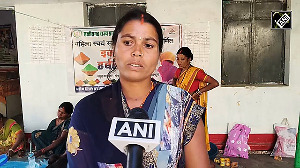Emotional eating is not a sin.
The problem arises when food is the only coping mechanism for dealing with emotions, points out Riddhi Jadhwani, health coach and co-founder, PositvEats.

When we are physically hungry our body is constantly alerting us to feed it.
So we are conscious that we need to eat as we are hungry.
However, when we are emotionally hungry, we find ourselves binge eating.
Before you know it, the bar of this or a bag of chips is gone.
Often, we emotionally eat to fill another void in our lives, and that void often has to do with feeling 'not good enough' in some way.
Emotional eating is not a sin!
When we become stressed, anxious, or worried, it's only human to gravitate towards food to cope with our emotions.
The problem arises when food is the only coping mechanism for dealing with emotions.
A few signs that you are emotional eater:
- Eating when you are not hungry
- Constantly thinking about food
- Eating in secret
- Using food as a reward
- Eating to feel happy or to soothe your feelings
Anything from work stress to financial worries, health issues to relationship struggles may be the root cause of your emotional eating.
These are three hidden forms of emotional eating which is also termed as PEP (Painkiller-Escape-Punishment).
Painkiller
No matter how happy or 'put together' we seem on the outside, we have underlying pain that we try to numb with food.
We often go for those heavy sugar, starchy, fatty, comfort foods (the name says it all) to avoid those painful feelings.
They make us feel full and sedated, so our binge helps us momentarily forget our troubles.
Escape
We use food as our escape when life feels too scary or overwhelming to face.
We're tired. We're stressed.
We don't want to be around people and put up a 'good' front.
Food provides the quickest way to shut down from fear and stress.
Punishment
The fact is that deep down, every food addict has a built-in desire for self-sabotage and destruction.
It usually comes from a deep-seated sense of worthlessness, embarrassment, or disgust in ourselves, our bodies or habits.
So we punish ourselves with binge eating and then hating ourselves afterward.
How to fix it
Start trying to eat mindfully.
Often, when we emotionally eat, we do it without really paying attention to what we’re doing.
We are so desperate for the happiness we think food will give us that we just scarf the food down. Instead, try slowing down and truly enjoying your meals.
When you can, make it a bit of a ceremony.
Eat from your nice dishes, turn off the TV and phone, light a candle.
Really be present for your meals. This will make you more aware of what you’re doing and likely curb the desire to emotionally eat.
Discovering a way to deal with negative emotions is often the first step toward overcoming emotional eating. This could mean writing in a journal, reading a book, or finding a few minutes to otherwise relax and unwind from the day.
Emotional eaters have a different connection with food.
Food not only serves a purpose for nourishment, but is our cure-all for boredom, anxiety, loneliness, and stress.
When you think food is what you are craving, stop and ask yourself, 'What's really going on?'
Am I trying to numb painful emotions?
Am I attempting to escape something that's overwhelming to me? Or am I punishing myself for something I've said or done?
It's easy to think these things don't affect your eating, but if you want a new relationship with food, it's vital to begin recognising the connection between your eating and your emotions.

Riddhi Jadhwani is a Mumbai-based nutritionist, a certified Medical Intuitive Health coach and co-founder of PositivEats, that guides individuals about eating the right foods for holistic wellbeing.
Disclaimer: All content and media herein is written and published online for informational purposes only. It is not a substitute for professional medical advice. It should not be relied on as your only source for advice.
Please always seek the guidance of your doctor or a qualified health professional with any questions you may have regarding your health or a medical condition. Do not ever disregard the advice of a medical professional, or delay in seeking it because of something you have read herein.
If you believe you may have a medical or mental health emergency, please call your doctor, go to the nearest hospital, or call emergency services or emergency helplines immediately. If you choose to rely on any information provided herein, you do so solely at your own risk.
Opinions expressed herein cannot necessarily provide advice to fit the exact specifics of the issues of the person requesting advice.











 © 2025
© 2025